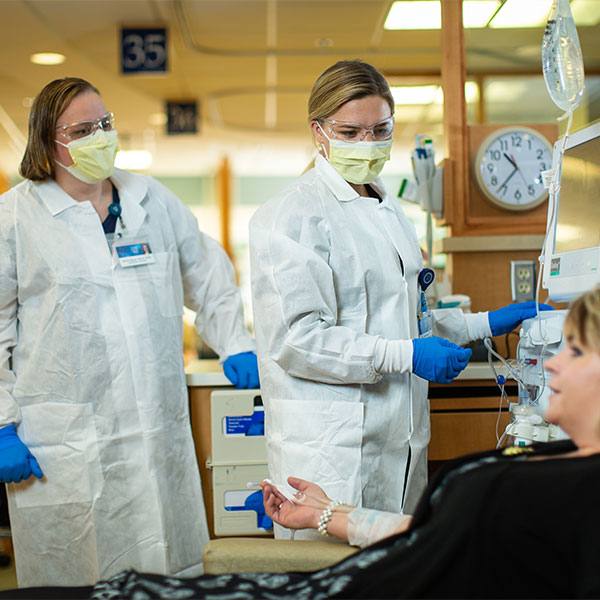-
Biotherapeutics
Inspired to deliver new regenerative healing solutions
Growing up the son of a neurologist in China, Ao "Kevin" Shi, often would read his mother's medical journals that featured Mayo Clinic research. Inspired, he pursued a career as a physician-scientist. Shi is now writing his own scholarly papers at Mayo Clinic that could transform care for people with peripheral vascular disease.
Shi is the second person in Mayo Clinic's Regenerative Sciences Training Program to defend his thesis paper and graduate from the Mayo Clinic Graduate School of Biomedical Sciences. His thesis documented evidence that a cell-free product discovered at Mayo Clinic, known as purified exosome product, triggered acceleration in ischemic wound healing in preclinical models. Ischemic wounds occur when arteries are clogged or blocked, preventing important nutrients and oxygen from reaching the skin to drive repair.
"My thesis focused on angiogenesis at wound healing. Angiogenesis is the process by which new blood vessels form. Specifically, my thesis examines whether cell-free exosomes can introduce new blood vessel formation in tissues where there is not sufficient blood supply for natural healing." says Shi. "My study seeks to answer what triggers blood vessel regeneration and how it can be optimized and applied to currently untreatable clinical conditions.
Mayo Clinic's Center for Regenerative Medicine developed the Regenerative Sciences Training Program to further its objective of preparing the future workforce to deliver the latest innovations in this new area of health care. Just as regenerative medicine is emerging, the Regenerative Sciences Training Program has evolved into a full-fledged Regenerative Sciences Ph.D. track within the Mayo Clinic Graduate School of Biomedical Sciences.
Building on existing research
Shi's thesis builds on the research of Atta Behfar, M.D., Ph.D., and Andre Terzic, M.D., Ph.D., who investigate the restorative qualities of exosomes. An example of the emerging field of nanomedicine, purified exosome product is an extracellular vesicle that can deliver instructions to damaged tissue to trigger healing. Nanodrugs are small structures that contain enveloped proteins and genetic materials that are targeted specifically at tissues in need of repair.
"Ao Shi's thesis provided insights that allow us to advance and broaden the possible applications of purified exosome products to conditions that currently have few treatment options," says Dr. Behfar, who is Shi's mentor and deputy director of Translation at Mayo Clinic's Center for Regenerative Medicine. Dr. Behfar is also the director of the Mayo Clinic Van Cleve Cardiac Regeneration Program where purified exosome product was discovered and is being studied. "This research has established a foundation that underpins scientific and clinical trial innovation to establish exosomes as a nanomedical cornerstone for regenerative medicine."
Vascular ischemia occurs when blood vessels narrow or become clogged, causing low blood supply that makes it difficult for the body to provide enough oxygen and nutrients to heal damaged tissue. It can lead to serious conditions, such as heart disease, chronic nonhealing wounds and gangrene. Peripheral ischemia is a leading cause of limb amputations. Existing treatments can ease symptoms, but they do not always fully heal blood vessels or restore blood flow to damaged tissue.
Dr. Shi was also the first author on a Mayo Clinic wound healing paper published recently in Theranostics that evaluated the impact of purified exosome products on ischemic wound healing in preclinical models. In this research, investigators documented skin healed free of scars with normal pores, hair follicles and sweat glands after just one treatment of the cell-free substance.
A circuitous path to Mayo Clinic
Shi grew up in the southwest China city of Kunming in the Yunnan province. He moved to the U.S. in 2013 to pursue a biochemistry degree at Wheaton College in Norton, Massachusetts. While there, he again heard about Mayo, deepening his interest in Mayo Clinic Graduate School of Biomedical Sciences.
He is graduating from Mayo Clinic Graduate School of Biomedical Sciences with a Ph.D. in biochemistry and molecular biology and a concentration in regenerative sciences.
"Mayo Clinic has a worldwide reputation and is known for high standards in its clinical and translational research. I wanted to do some work that's more clinically oriented and translationally based. That's why I picked Mayo's graduate school," says Shi.
Next fall, Shi will begin medical school at St. George's University of London. He does not know what specialty he will pursue. Wherever his education takes him, Shi acknowledges he will always have an interest in research, education and practice at Mayo Clinic.
###










